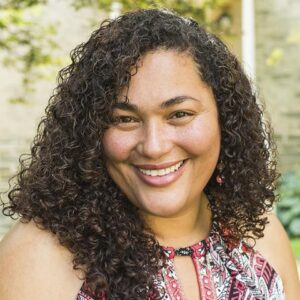Raquel believes in the power of stories and her story has included more than 25 years working in education. Over the past decade that she’s been at Haverford, she has worked at the Writing Center and the Office of Academic Resources. She has also worked as the Assistant Dean of First Generation, and/or Low-Income (FLI) Students, Interim Co-Chief Diversity Officer, an Advising Dean, and the Associate Dean of Student Diversity, Equity, and Inclusion. However, her journey through academia has not always been welcoming.
Her story in academia began as a FLI and BIPOC (Black, Indigenous, person of color) undergraduate student who attended classes part-time while working full-time. She felt invisible, inconsequential, and alone in her academic pursuits at a primarily white and affluent institution. She felt so discarded that upon graduation she decided her academic career was over. She would not go back to a place where she was treated as though she did not belong. However, eventually, she did return but this time she came armed with the truth that her undergraduate story of struggle, invisibility, and institutional neglect was not unique nor a sign of her inferiority. It was not her failure to own but it was a problem she wholeheartedly took on through each professional role she inhabited.
Through every stage of her career and every chapter of her story, she worked to make educational pathways and opportunities more equitable and accessible for historically marginalized students. Her work included helping others take back their authorship, their power, and write themselves out of the shadows and away from the margins that others relegated them to, and instead to write themselves into the center, at a table of their making with seats for everyone, in a world where no one is illegal, illegitimate, inconsequential or invisible. For writing is making the unseen, visible, it’s the birthing of ideas and dreams into the realm of tangible possibility. It is using the ashes you’ve been given to write a new world into existence.
In this world, the power of sharing your collective stories and rewriting them as interwoven communal narratives is unleashed and we both reach within and reach out for those who don’t yet know the validity, beauty, and strength of their story, just like Raquel didn’t know during her undergrad years. It is in the sharing of your narratives, and thus the sharing of yourselves, where you labor for a more just and equitable world where we liberate one another. It is then we can freely say, just as Esperanza in Sandra Cisneros’ book, The House on Mango Street, declared “…I have gone away to come back. For the ones I left behind. For the ones who cannot out.”.
That sentence embodies Raquel’s mission, it’s the theme that runs through her story. She came back to academia’s towers, a place that wasn’t built for her nor those like her. Then, through each position she’s held, she’s worked to refashion them from within. This labor persists today and each day that follows because this story is still being written and this work will never end. It’s about making academia more accessible and equitable for those who’ve been perpetually left out/side and barred by biases, fallacies, a multitude of isms, policies, politics, edicts, economics, and other gate-keeping measures.
This story is also a promise Raquel made to herself and to all those who were blocked from finding their way in and/or their path through academia. I have come in(to this ivory tower) now…I have unmasked you, demystified you. You cannot deny me access any more. You will not deny access to those that come after me. I will write a bridge through your fortress and I will pave a road because now that I am here I bring everyone with me. No one will be left outside of (academia’s) gates again. I bring my grandparents, my parents, my children and all the children yet to come. I come once and for all and forevermore. This is my journey. This is my struggle. This is my present but not my end. I am here!

